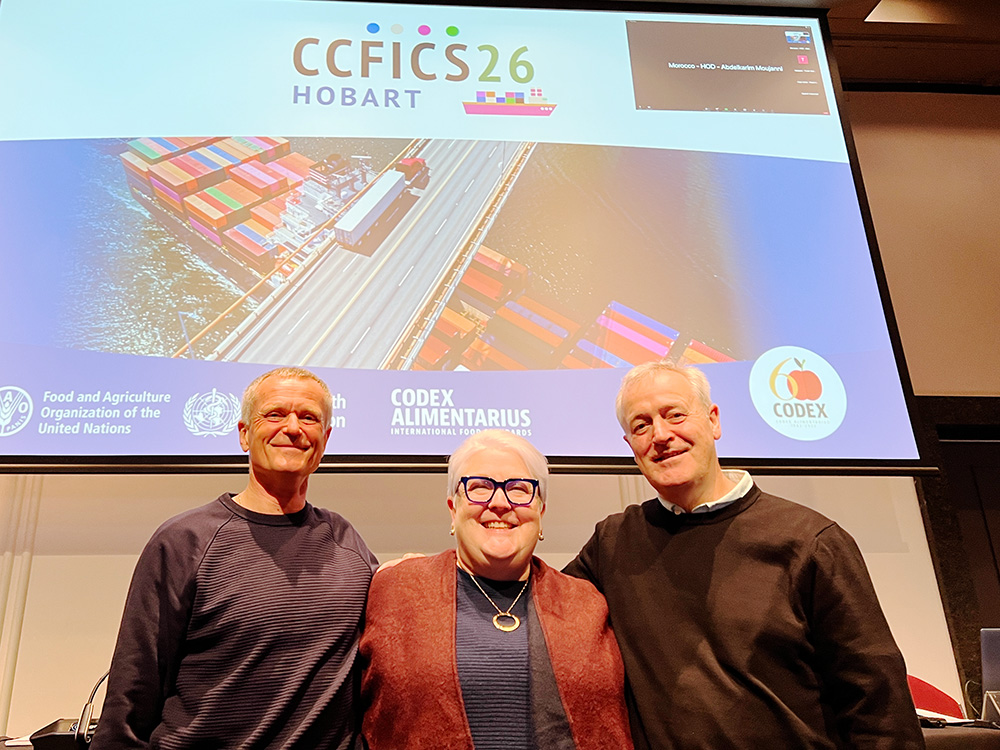Codex60 / presentation of two newly published guidelines at CCFICS
In 2022 the Codex Secretariat began work on reviewing the formatting and layout of Codex texts to ensure consistency, to meet FAO and international publishing standards and to enhance readability. A digital object identifier has also been added to standards as they are published, providing a unique reference that can support tracking and citation of each text. The project is part of the Codex Secretariat’s contribution to the celebration of the 60th anniversary of the Codex Alimentarius Commission.
As the Codex Committee on Food Import and Export Inspection and Certification Systems (CCFICS) drew to a close on 5 May 2023 in Hobart, Australia, the Codex Secretariat spoke to two of the countries responsible for leading the work on Guidelines for design, production, issuance and use of generic official certificates and Principles and guidelines for the assessment and use of voluntary third-party assurance programmes.

(l to r) Erik Bosker (The Kingdom of the Netherlands), Nicola Hinder, Chairperson CCFICS (Australia), Mike O’Neill (United Kingdom of Great Britain and Northern Ireland)
Erik Bosker (Nertherlands, kingdom of the), who chaired the working group on certificates said: “The new format is a real improvement of the readability of the text and the contents provides a helpful overview of this guidance.”
“I think the new format and layout looks great,” said Mike O’Neill (United Kingdom) commenting on the guidance on third-party assurance programmes. “It’s much cleaner and should help those considering the implementation to better understand the content and approach set down. There’s been a lot of interest with pilot projects underway in Latin America, Africa and the Near East so I’m sure all of the pilot countries will appreciate seeing the guidelines in the new format.”
Learn more
Guidelines for design, production, issuance and use of generic official certificates (CXG 38-2001)
Photo credit ©FAO/Codex
At the heart of the Codex mandate are the core values of collaboration, inclusiveness, consensus building and transparency. Governmental and non-governmental, public and private organizations alike play a vital role in ensuring Codex texts are of the highest quality and based on sound science.
Codex would have little authority in the field of international standard setting if it did not welcome and acknowledge the valuable contributions made by observers. Expert technical bodies, industry and consumer associations
contribute to the standard-setting process in a spirit of openness, collaboration and transparency.
Intergovernmental organizations (IGOs) and international non-governmental organizations (NGOs) can apply for observer status in Codex in order to attend and put forward their views at every stage of the standard-setting process.
 Current Codex Alimentarius Commission
Current Codex Alimentarius Commission
Codex60 / presentation of two newly published guidelines at CCFICS
In 2022 the Codex Secretariat began work on reviewing the formatting and layout of Codex texts to ensure consistency, to meet FAO and international publishing standards and to enhance readability. A digital object identifier has also been added to standards as they are published, providing a unique reference that can support tracking and citation of each text. The project is part of the Codex Secretariat’s contribution to the celebration of the 60th anniversary of the Codex Alimentarius Commission.
As the Codex Committee on Food Import and Export Inspection and Certification Systems (CCFICS) drew to a close on 5 May 2023 in Hobart, Australia, the Codex Secretariat spoke to two of the countries responsible for leading the work on Guidelines for design, production, issuance and use of generic official certificates and Principles and guidelines for the assessment and use of voluntary third-party assurance programmes.

(l to r) Erik Bosker (The Kingdom of the Netherlands), Nicola Hinder, Chairperson CCFICS (Australia), Mike O’Neill (United Kingdom of Great Britain and Northern Ireland)
Erik Bosker (Nertherlands, kingdom of the), who chaired the working group on certificates said: “The new format is a real improvement of the readability of the text and the contents provides a helpful overview of this guidance.”
“I think the new format and layout looks great,” said Mike O’Neill (United Kingdom) commenting on the guidance on third-party assurance programmes. “It’s much cleaner and should help those considering the implementation to better understand the content and approach set down. There’s been a lot of interest with pilot projects underway in Latin America, Africa and the Near East so I’m sure all of the pilot countries will appreciate seeing the guidelines in the new format.”
Learn more
Guidelines for design, production, issuance and use of generic official certificates (CXG 38-2001)
Photo credit ©FAO/Codex
 Codex and Observer
Codex and Observer
around the world since ancient times.
We might not always know where it comes from,
but we expect it to be available, safe and of good quality.









Leave a comment